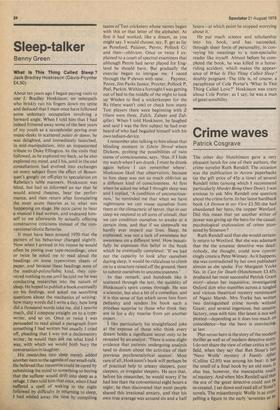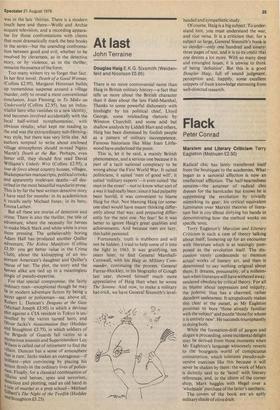Crime waves
Patrick Cosg rave The other day Hutchinson gave a very pleasant lunch for one of their authors, the crime novelist Ruth Rendell. The occasion was the publication in Arrow paperbacks (at the gift price of 45p a time) of several Rendell titles (among which I recommend particularly Murder Being Once Done),I was anxious to ask Mrs Rendell one question about the crime form. In her latest hardback book (A Demon in my View £3.50) she had abandoned her hero, the copper Wexford. Did this mean that yet another writer of power was giving up the hero for the casual, psychological exploration of crime pioneered by Si menon ?
Ruth Rendell said that she would certainly return to Wexford. But she was adamant that the the amateur detective was dead: nobody, she thought, could now convincingly create a Peter Wimsey. As it happens. she was contradicted by her own publishers almost as she spoke. For Margaret Yorke h'as, in Cast for Death (Hutchinson 0.45), produced her most successful Patrick Grant story—about her inquisitive, investigating Oxford don who stumbles across a tangled and vicious theatrical mystery reminiscent of Ngaio Marsh. Mrs Yorke has written two distinguished crime novels without Grant ; and several ingenious, but unsatisfactory, ones with him. Her latest is not well plotted—depending as it does too much on coincidence—but the hero is convincing. at last.
Plot versus hero is the story of the modern thriller as well as of modern detective storY. I do not share the view of other critics in this field, when they say that Rex Stout's last 'Nero Wolfe' mystery A Family API' (Collins £2.95) was among his best: it has the smell of a final book by an old man. It also has, however, the inescapable touch of mastery. And when Mrs Rendell said that the era of the great detective could not t:e re-created, I sat down and read all of Stout 5 novels. The misanthropic Wolfe is as corn' pelling a figure in the early 'seventies as Ile
was in the late 'thirties. There is a modern touch here and there—Wolfe and Archie acquire television, and a recording apparatus for those confrontations with clients that most dramatically mark the best books in the series—but the unending confrontation between good and evil, whether to be resolved by cleverness, as in the detective story, or by violence, as in the thriller, remains t he essence of the form.
Too many writers try to forget that fact. In her first novel, Death of a Good Woman, (Collins £2.95), Margaret Hinxman builds up tremendous suspense around a village murder, only to reveal a most conventional conclusion. Joan Fleming, in To Make an Underworld (Collins £2.95), has an industrialist hero who vanishes to a new identity, and becomes involved accidentally with the local half-witted nymphomaniac, with obvious results; what kept me reading to the end was the extraordinary sub-Hemingway style, but there was very little else. All authors tempted to write about enclosed Village atmospheres should re-read Ngaio Marsh's Death at the Bar. Perhaps, even better still, they should first read David Williams's Unholy Writ (Collins £2.95), a tour de force about country houses, villages, Shakespearian manuscripts, political crooks and apparently irrelevant deaths—all described in the most beautiful mandarin prose. This is by far the best written detective story I have read for months: in its academicism it recalls early Michael Innes; in its hero, Emma Lathen.
But all these are stories of detection and crime. There is also the thriller, the tale of adventure, where the necessity for heroes to make black black and white white is even more pressing. The unbelievably boring Adam Hall has produced another Quiller adventure, The Kobra Manifesto (Collins £3.50: you get better value in the Crime Club), about the kidnapping of an imPortant American's daughter and Quiller's rescue of her. The plot, the story and the heroes alike are tied up in a meaningless Jungle of pseudo-expertise.
For that special compromise, the fairly ordinary man—exceptional though he may be in modern adventure fiction by being a secret agent or policeman—see, above all, Robert L. Duncan's Dragons at the Gate (Michael Joseph £3.95) in which a devious Plot against a CIA resident in Tokyo is unravelled by the victim turned hero, and Oliver Jacks's Assassination Day (Hodder and Stoughton £3.75), in which soldiers of the Brigade of Guards fall victim to a IrtYsterious assassin and Superintendent Len Wilson is called out of retirement to find the villain. Duncan has a sense of atmosphere !Fiat is rare; Jacks makes an outrageous—if brilliant—plot convincing by placing his action firmly in the ordinary lives of police!1?en. Finally, for a classical combination of ,villains and heroes, spies and terrorism, "ietection and plotting, read an old hand in 4,tale of murder at a prep school—Michael 'filbert's The Night of the Twelfth (Hodder 4nd Stoughton £3.25).



































 Previous page
Previous page